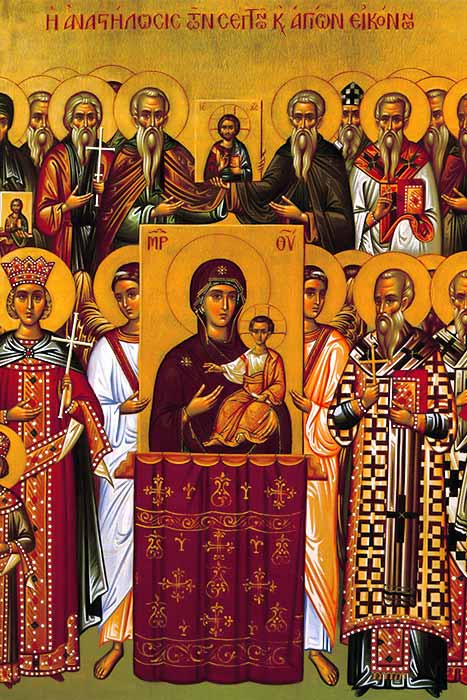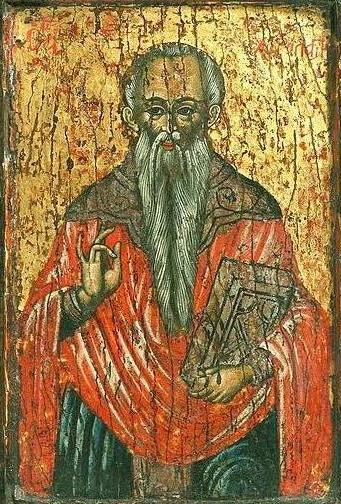And when the time came for their purification according to the law of Moses, they brought Him up to Jerusalem to present Him to the Lord (as it is written in the law of the Lord, “Every male that opens the womb shall be called holy to the Lord”) and to offer a sacrifice according to what is said in the law of the Lord, “a pair of turtledoves, or two young pigeons.” Now there was a man in Jerusalem, whose name was Simeon, and this man was righteous and devout, looking for the consolation of Israel, and the Holy Spirit was upon him. And it had been revealed to him by the Holy Spirit that he should not see death before he had seen the Lord’s Christ. And inspired by the Spirit he came into the temple; and when the parents brought in the child Jesus, to do for Him according to the custom of the law, he took Him up in his arms and blessed God and said, “Lord, now lettest thou Thy servant depart in peace, according to Thy word; for mine eyes have seen Thy salvation which Thou hast prepared in the presence of all peoples, a light for revelation to the Gentiles, and for glory to Thy people Israel.” And His father and His mother marveled at what was said about Him; and Simeon blessed them and said to Mary His mother, “Behold, this Child is set for the fall and rising of many in Israel, and for a sign that is spoken against (and a sword will pierce through your own soul also), that thoughts out of many hearts may be revealed.” And there was a prophetess, Anna, the daughter of Phanuel, of the tribe of Asher; she was of a great age, having lived with her husband seven years from her virginity, and as a widow till she was eighty-four. She did not depart from the temple, worshiping with fasting and prayer night and day. And coming up at that very hour she gave thanks to God, and spoke of Him to all who were looking for the redemption of Jerusalem. And when they had performed everything according to the law of the Lord, they returned into Galilee, to their own city, Nazareth. And the Child grew and became strong, filled with wisdom; and the favor of God was upon Him.
Luke 2: 22-40 (Gospel from the Presentation of Christ)
On February 2, we mark forty days since the Nativity of Christ with the Feastday of Presentation into the Temple. In Leviticus 12, we read instructions that when a woman has a child and it is a boy, she is to be purified for forty days and if it is a girl, she is to be purified eighty days. At the end of the purification period, she is to present the child in the temple along with a sacrifice of pigeons or turtle doves.
So when Jesus was forty days old, Mary and Joseph took Him to the temple, to do what the Law prescribed. A priest was on duty in the temple named Simeon. He was promised that he wouldn’t die until he saw the Christ. When he saw Mary and Joseph and the baby Jesus, he knew that this was the promised Christ. He uttered the now well-known prayer: “Lord, not lettest Thou Thy servant depart in peace.” (Luke 2: 29)
In the Orthodox Church, there is the beautiful Tradition of a baby being “churched” or presented in the temple on its fortieth day. Both boys and girls are brought for the first time to the church when they are forty days old. A priest greets them in the narthex and offers four prayers. The first prayer is for the mother, thanking God for preserving her in childbirth. The second prayer is also for the mother, restoring her to full Communion. There is a canon that says a person is excommunicated if they miss services for three weeks in a row (I guess it’s fortunate that we don’t enforce that one!). So, if a person is excommunicated, there is a prayer for restoration when Communion resumes. A new mother typically does not commune during her forty days. Thus the prayer to resume Communion is offered. The third prayer is for the new born child. The forth prayer also asks for blessings for the child, in addition to parents and Godparents (if they are known at the time of the forty days, they should attend and stand with the parents). The baby is then taken by the priest, in his arms, and carried into the church for the very first time. Boys are usually taken behind the altar and girls are taken to the Royal Gates but not through them. The priest then offers the prayer of Simeon. I take the boys into the altar via the “south door” and behind the back of the altar, in front of the large crucifix, I offer the prayer of Simeon, placing the head of the boy on the feet of the Lord. For girls, I stand in front of the Royal Gates, begin the prayer and then step to the left to the icon of the Virgin Mary, where I place the head of the girl on the hands of the Virgin Mary. The service then concludes and the baby is given back to its mother.
There are a couple of lessons from this Gospel passage. First, we can see that most of our Traditions are based in Scripture. The Bible doesn’t mention the narthex or four prayers; those came later. The Bible tells us that from the Old Testament, there was a presentation of children into the temple. It tells us the prayer of Simeon, offered over Jesus. And it tells us that the interval of time was forty days after His Nativity. As with most of our Traditions, they are based in Scripture and evolve from there.
The second lesson comes from Luke 2:23, that “every male that opens the womb shall be called holy to the Lord.” It’s no longer every first-born child but all children that are consecrated Holy to the Lord. Does that title “holy to the Lord,” represent your child? If your child is a great student and a gifted athlete but is not “holy to the Lord,” we, as parents, have done something wrong. If we run our children to school and sports but we don’t take them to church to consecrate them to the Lord, we are doing something wrong. “Holy to the Lord” should be a description used to describe every child. This is the responsibility of every parent. In Greece, February 2 is Mothers’ Day, which actually makes a lot of sense. On this day that Christ was brought to the temple, and blessed along with His mother, all moms should feel blessed and also should remember the burden they carry, not only to raise children but to raise them for Christ.
The final lesson comes from the last thing that Simeon said to Mary. What a thrill it must have been for Mary and Joseph to have their son recognized by a priest they didn’t even know. It confirmed for them, at forty days, that Mary had indeed given birth to the Son of God. That joy must have quickly faded when Simeon turned to Mary and said “Behold, this child is set for the fall and rising of many in Israel, and for a sign that is spoken against (and a sword will pierce through your own soul also), that thoughts of many hearts may be revealed.” (Luke 2: 34-35) I have sat with many a parent with a child who is sick, who has a developmental delay, and unfortunately with several parents of children who have passed away. I have quoted this verse as well, knowing that a sword has pierced the soul of good parents, people I have considered friends. I believe that something good can come out of anything, even something catastrophic and very bad. I have tried to encourage parents who have lost children, once some time has passed, to remember the end of this verse, that “thoughts of many hearts may be revealed.” After the sword pierced through Mary’s soul, many (a countless number) have had thoughts of dedicating their whole lives to being followers of Christ. Mary’s pain was the world’s salvation. For those who have lost children or who have very sick children, it may take a long time for the thoughts of the many hearts to be revealed. It may take a long time for any good feeling to come back, or for anything to make any kind of sense. But I believe in my heart it eventually does, and for those who have felt the sword pierce through their own soul, that there is eventually exaltation for you, the same way that Mary is exalted, not only by us, but by God Himself.
Lady full of grace, rejoice, O Virgin Theotokos, for Christ our God, the Sun of righteousness has risen from you and He illumined those in darkness. And you, righteous Elder, be glad in heart, receiving in your embraces the One who liberates our souls and bestows on us the Resurrection. (Apolytikion of the Presentation of Christ, Trans. By Fr. Seraphim Dedes)
A joyful holiday, the foundation of a beautiful Tradition, a connection between Scripture and Tradition, and a source of hope for moms and dads who have suffered loss. These are the many lessons that come to us from today’s feast of the Presentation of Christ.

